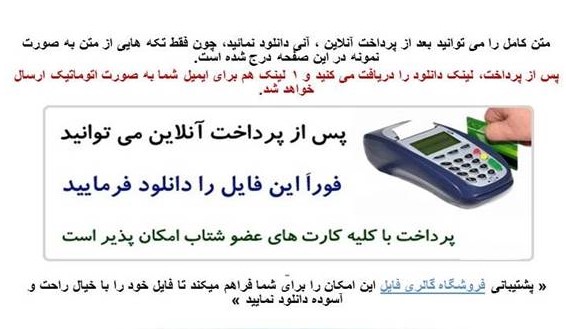لینک دانلود و خرید پایین توضیحات
فرمت فایل word و قابل ویرایش و پرینت
تعداد صفحات: 10
1
Plato on Education and Art
Rachana Kamtekar
1. Introduction
Concern with education animates Plato’s works: in the Apology, Socrates
describes his life’s mission of practising philosophy as aimed at getting the Athenians to
care for virtue (29d-e, 31b); in the Gorgias, he claims that happiness depends entirely on
education and justice (470e); in the Protagoras and Meno he puzzles about whether virtue
is teachable or how else it might be acquired; in the Phaedrus he explains that teaching
and persuading require knowledge of the soul and its powers, which requires knowledge
of what objects the soul may act upon and be acted upon by, which in turn requires
knowledge of the whole of nature (277b-c, 270d); in the Laws the Athenian Stranger says
that education is the most important activity (803d), and that the office of director of state
education is the most important office of the state (765d-e). Each of Plato’s two longest
works, the Laws and Republic, tirelessly details a utopian educational programme. And
Plato’s outlook on the arts (poetry, theatre, music, painting) is dominated by
considerations of whether they help or hinder correct education.1
To bring Plato’s vast and multifaceted concern with education into focus it will be
helpful to begin by looking through the lens of his differences with those he styles
Socrates’ educational rivals: sophists like Protagoras, teachers of rhetoric like Gorgias,
and ultimately poets like Homer. Plato sees the differences between these educators and
Socrates not only as a difference over what subject-matter is worth learning, but also as a
difference over the nature of would-be learners’ powers to learn. By understanding these
differences we will gain insight into the motivation for Plato’s positive educational
proposals in the Republic and Laws. 2 For Plato’s educational proposals go hand-in-hand
with his psychology:3 his distinctive account of human capacities to learn specifies the
good human condition at which his educational proposals aim.
2. Socrates and the rival educators
The 5th and 4th centuries were a period of great intellectual and cultural
productivity in Athens, but at the same time, élite Athenians came to see a need for an
education beyond the traditional immersion in culture and military training. We find
ample evidence of this in the writings of Isocrates in the 4th century, but also in the
phenomenon, well-documented by Plato, of itinerant teachers in a variety of subjects,
most importantly in persuasive speaking, flocking to Athens during Socrates’ lifetime. A
number of factors can explain this new interest in education beyond the traditional.
Athenian political life had changed radically through the 5th century, with reforms in
democratic institutions making possible greater popular participation (for example, jury
duty and assembly attendance were now compensated for by a day’s wage), at the same
time as Athens’ imperial pursuits greatly complicated its political affairs. Would-be
political leaders now had to communicate effectively with a wider cast of people than
previously, and on a wider range of affairs. Now successful political leadership called for
expertise in public speaking; expertise in military strategy, once a prerequisite for
leadership, became dispensable (cf. Aristotle, Politics 1305a11-15).
2.1 The teachers
The teachers who came to Athens to meet this new demand promised tomorrow’s
politicians the means to personal and political success. According to Plato, Protagoras
claimed to teach ‘sound deliberation, both in domestic matters—how best to manage
3
one’s household, and in public affairs—how to realize one’s maximum potential for
success in political debate and action’ (Protagoras 318e-19a), and Gorgias claimed to
teach ‘oratory’ (Gorgias 449a), that is, ‘the ability to persuade by speeches judges in a
law court, councillors in a council meeting, and assemblymen in an assembly or in any

تحقیق درموردمتن انگلیسی متن انگلیسی خانم بیات